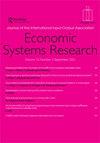德国工业的能源效率和反弹效应——来自宏观经济计量模型的证据
IF 1.6
4区 经济学
Q2 ECONOMICS
引用次数: 10
摘要
能源效率的提高会因反弹效应而降低。微观层面的效率提高并不能导致宏观层面的能源消耗相应减少。应用德国能源经济模型PANTA RHEI来更好地理解反弹效应。为了获得更稳健的估计,德国制造业成本结构调查的微观数据被用来推导能源需求的价格弹性。制造业行业层面能源效率自主提高的中间经济反弹效应在2021年为7%至2030年为12%。宏观经济反弹效应在2021年的12%到2030年的18%之间。包括必要的投资和假设更高的替代弹性会增加影响。反弹效应限制了技术驱动的效率提高的范围,在设计雄心勃勃的能源效率计划和气候政策时必须加以考虑。本文章由计算机程序翻译,如有差异,请以英文原文为准。
Energy efficiency and rebound effects in German industry – evidence from macroeconometric modeling
Increases in energy efficiency are reduced by the rebound effect. Efficiency gains on the micro level do not lead to proportionate reductions of energy consumption on the macro level. The German energy-economy model PANTA RHEI is applied to better understand the rebound effect. To get more robust estimates micro data from a cost structure survey of the German manufacturing sector was used to derive price elasticities of energy demand. The mesoeconomic rebound effect of an autonomous increase in energy efficiency at the industry level in manufacturing is between 7% in 2021 and 12% in 2030. The macroeconomic rebound effect lies between 12% in 2021 and 18% in 2030. Inclusion of necessary investment and assumptions of higher elasticities of substitution increase the effects. Rebound effects limit the scope of technology-driven efficiency improvements and must be considered in the design of ambitious energy efficiency programs and climate policies.
求助全文
通过发布文献求助,成功后即可免费获取论文全文。
去求助
来源期刊

Economic Systems Research
ECONOMICS-
CiteScore
5.60
自引率
4.00%
发文量
17
期刊介绍:
Economic Systems Research is a double blind peer-reviewed scientific journal dedicated to the furtherance of theoretical and factual knowledge about economic systems, structures and processes, and their change through time and space, at the subnational, national and international level. The journal contains sensible, matter-of-fact tools and data for modelling, policy analysis, planning and decision making in large economic environments. It promotes understanding in economic thinking and between theoretical schools of East and West, North and South.
 求助内容:
求助内容: 应助结果提醒方式:
应助结果提醒方式:


